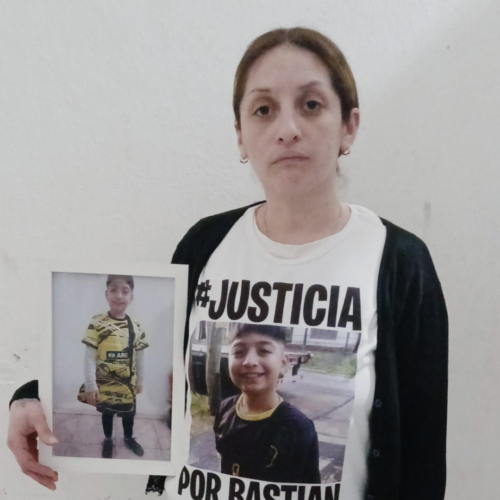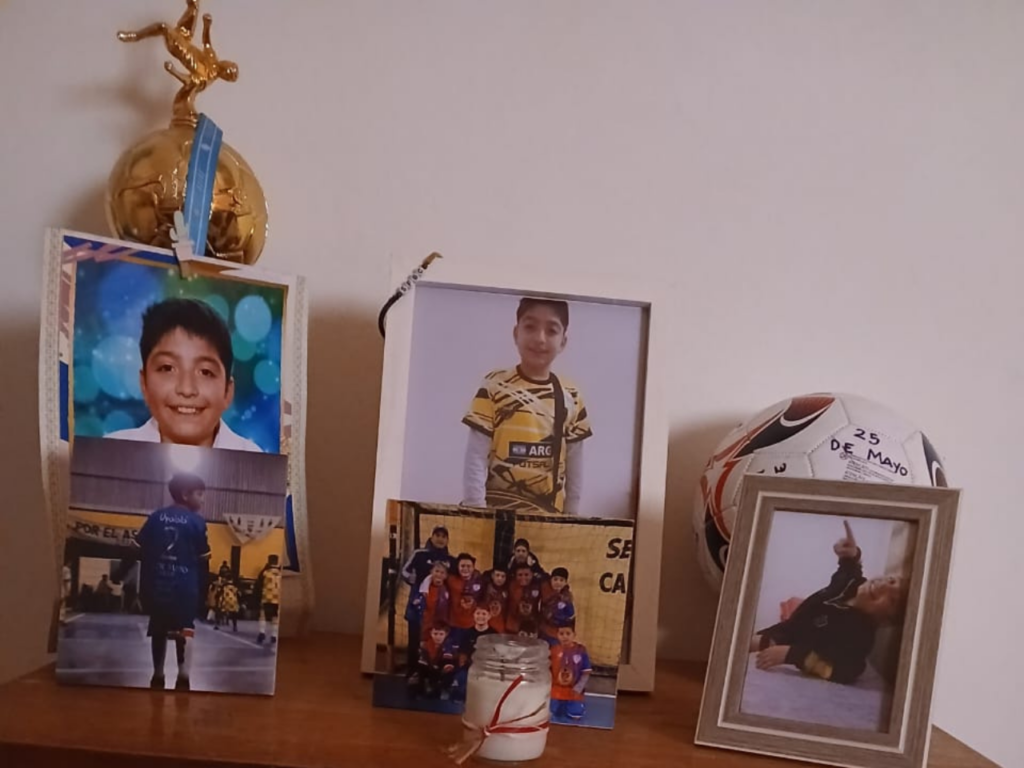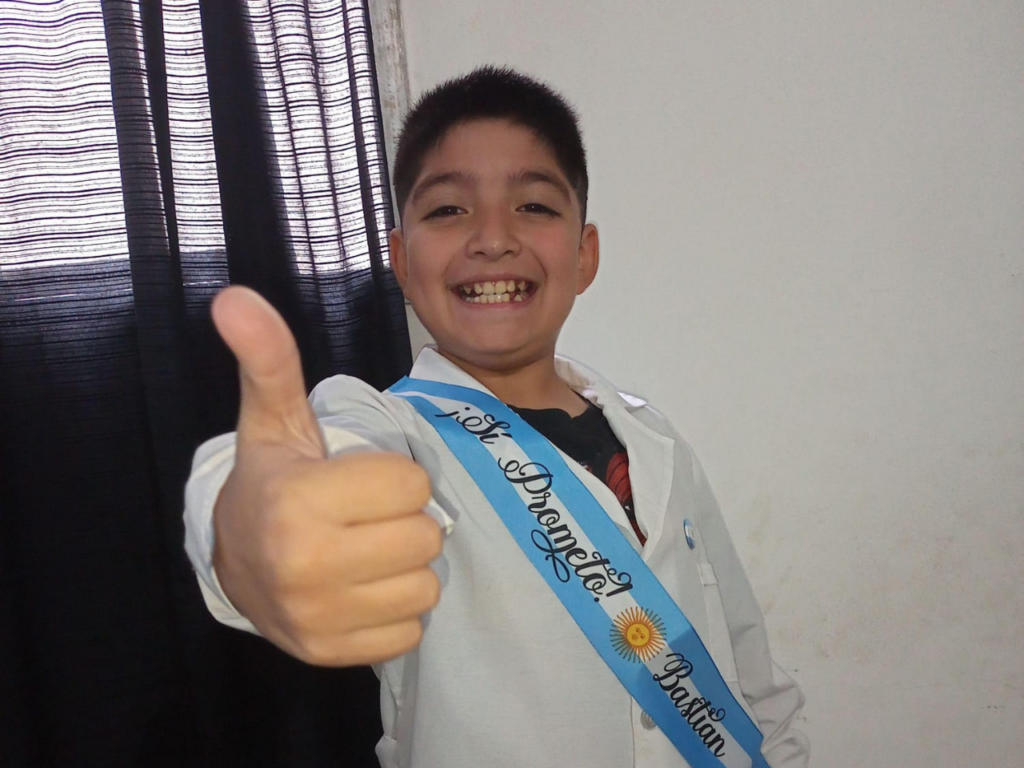Mother demands justice after police officer fatally shot her 10-year-old son in July
The thieves and motorcycles had vanished, but the gunfire continued. In shock, I cradled my son’s head as blood poured from a wound in his neck. I screamed for help, and neighbors quickly arrived.
- 1 year ago
October 12, 2024

WILDE, Argentina — I walk through my home, and with every step, I feel the profound absence of my youngest son Bastian. Murdered before my eyes, I heard his cries for help and held him in my arms as he faded away. His desperate gaze, pleading for me to save him, haunts me constantly. The image refuses to leave my mind. Despite my overwhelming grief, I push forward for my two daughters and the pursuit of justice. I am determined to ensure that Bastian’s killer is held accountable.
Read more crime & corruption stories at Orato World Media.
Gunfire shattered our lives: “Ay, Ma” Bastian whispered before he fell
On Tuesday, July 9, 2024, Bastian returned to the soccer field for the first time after recovering from a knee injury. Finally free from pain, he looked overjoyed and came home beaming with a huge smile. The next day, he had training and when I arrived home from work that Wednesday, I found Bastian waiting for me dressed in full soccer gear.
These were the days my son loved most. The fatigue I felt from work instantly disappeared when I saw him. Going to the soccer club with Bastian became a welcome distraction, as I chatted with other mothers while the boys played. After training, we headed home—Bastian on his bike, pedaling slowly, while I walked beside him.
His dad was scheduled to pick him up later to take him to his grandfather’s birthday party, but he never made it. As always, after a session, Bastian emanated energy, eagerly recounting every play, pass, and goal in great detail. His excitement felt contagious, and I loved seeing that enthusiasm in him. He was so full of life.
We turned a corner and barely went a few yards when I looked up and saw a group of people on motorcycles in a strange, suspicious situation. Suddenly, a man in the middle pulled out a revolver. I realized they were trying to rob him, and he was about to shoot back.
Panic set in, and somehow, I managed to get Bastian to turn around. “Let’s go!” I shouted, and we rushed toward the corner. I heard gunshots and saw a motorcycle speed past. Then I heard Bastian say, “Ay, ma,” and I turned to see him fall from his bike.
My son died in my arms, shot by a police officer
While the man, who I later learned was a policeman, kept shooting wildly, I threw myself to the ground and held Bastian. The thieves and motorcycles vanished, but the gunfire continued. In shock, I cradled my son’s head as blood poured from a wound in his neck. I screamed for help, and neighbors quickly arrived. I desperately searched for his wounds, trying to reassure him by saying everything was going to be okay.
Bastian just looked at me, pleading, until he faded away and his eyes closed. As Bastian faded out of consciousness, I grew desperate. A patrol car arrived, and we rushed to the nearest clinic, but they told us they lacked the tools to help him. The patrol car then took us to the local hospital. During the drive, I called my husband to tell him what happened. In confusion, he asked many questions. I just said, “Go to the hospital, I will meet you there,” and hung up.
At the hospital, everything moved at an incomprehensible speed. We arrived at the emergency entrance, and the staff took Bastian to a bed, out of my sight, to be treated by the doctors. They gave him six blood transfusions and performed multiple surgeries. Bastian was severely injured. I later learned from judicial experts that the bullets used were hollow, designed for hunting, which caused even more damage. Bastian remained in surgery for four long hours. The cold, hunger, and exhaustion I felt did not matter. I focused all my energy on hoping he would survive. I sent worried messages to my daughters, who planned to stay at a friend’s house that night.
Clinging to hope in a hospital: “Along with Bastian, a part of me died.”
At 1:00 a.m., the doctors approached wearing a serious expression. They explained everything they did in surgery then indicated Bastian remained in critical condition. “If he survives, he may have lasting effects,” they warned. Surrounded by family, I spent the night in an uncomfortable hospital chair, unable to sleep or rest. By 8:00 a.m. I clung to optimism, thinking, “If there’s no bad news, maybe it’s a good sign.” Then, reality struck. Bastian went into cardiac arrest, and at 9:04 a.m., my son passed away.
Immediately, I called my daughters to tell them the news, but they already knew. I felt furious they found out that way, and heartbroken I could not be there to tell them myself and comfort them. I felt shattered. Along with Bastian, a part of me died. In shock, I did not know what to do. We stayed at the hospital for a while before I could bring myself to leave. Journalists gathered outside my house, so we went to my sister-in-law’s home to avoid them. I did not want to see anyone or face what happened.
After the funeral, I returned home. Every time I walk through the door now, it feels incredibly difficult. I always hope to see him sitting there, waiting for me. The house remains enveloped in emptiness. Bastian was the loudest in the family. His presence filled the space, whether it was the sound of the ball against the wall, the television blaring, his laughter, or his constant chatter. All of that vanished in an instant, and the house changed forever.
Struggling to move forward
My only moments of distraction come from my daughters. They feel as heartbroken as me, but we try to talk about other things and support each other to ease the pain. Bastian shared a room with them, and his bed still sits there. I know they need me to take it out, but I have yet to find the strength.
Whenever I think about removing his things, guilt overwhelms me. It feels wrong. I set up a small table with his photos, trophies, and a soccer ball, and I look at it every day for strength as I fight for the justice he deserves. I talk to him, but I feel no response.

I am outraged that someone meant to protect us, a policeman, killed my son. I now take pills to sleep, calm my nerves, and manage my depression, which helps me rest somewhat. But the pain remains unbearable, as I relive the same nightmare every day.
The image of my son bleeding to death in my arms haunts me. He practically died on top of me. I rarely go out, and when I do, I feel constantly afraid, paralyzed by the sound of engines, thinking gunfire could erupt at any moment. Despite the obstacles from authorities, I will not stop until my son gets justice. His killer must pay for what he did.



































































































































































































































































































































































































































































